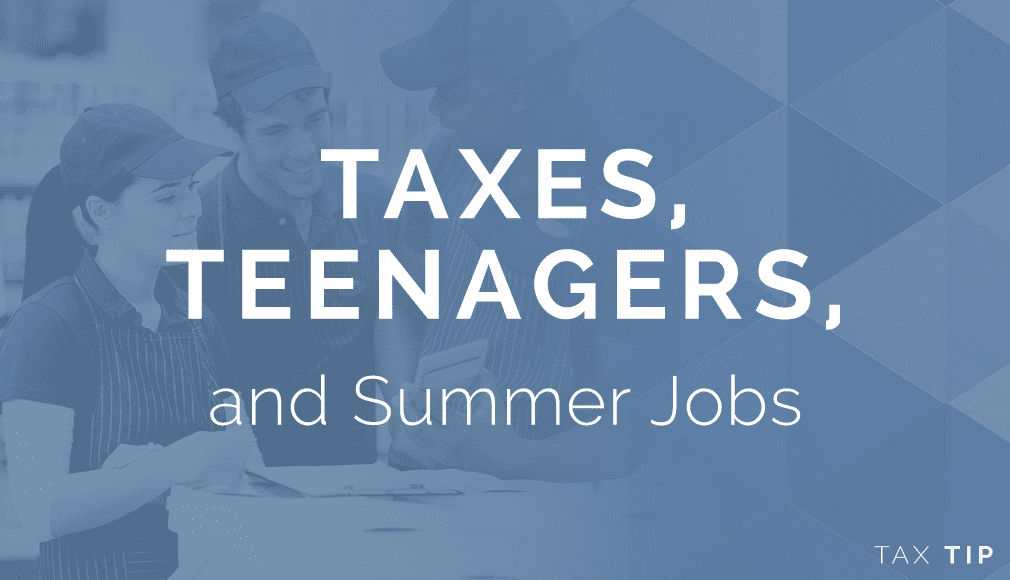

Is your teenager planning to get a job this summer? About one-third of kids between 16 and 19 work during their summer break, according to the Pew Research Center. But what do they need to know about the financial side of life in the workforce? The New Jersey Society of CPAs gets teen workers and their parents up to speed on taxes and summer employment.
Students may hear a lot about taxes in the news or at the dinner table, but a summer job is likely their first experience in actually paying taxes. As a result, they may be surprised when they receive their first paycheck and find that it’s not quite as much as they expected. If they have big dreams for using or saving the money they’ll earn, it’s important to know how much money they’ll actually take home and how much will be withheld each week so that their plans remain on course.
Employers generally ask every worker—including temporary summer help—to fill out a federal Form W-4 and a state Form W-4 (if applicable), which gathers information about them and is used to calculate the amount of federal and state income taxes that should be withheld from every paycheck. Even if the employee doesn’t earn enough to owe federal and state income taxes, employers typically must withhold Social Security and Medicare taxes. An employee’s first paycheck, which should detail how much is being withheld for various taxes, will provide a great deal of information and make it easier to budget for the rest of the summer.
Associate Partner Kelly Raso, CPA offers the following advice on withholding: “If you claim exemption from withholding, your employer will not withhold federal income tax from your wages. The exemption applies only to income tax, not to Social Security or Medicare tax.
You can claim exemption from withholding for the current year only if both the following situations apply:
• For the prior year, you had a right to a refund of all federal income tax withheld because you had no tax liability.
• For the current year, you expect a refund of all federal income tax withheld because you expect to have no tax liability.”
If a teenager’s summer job includes tips, they should be sure to keep daily records of all cash tips received and report total cash tip income of $20 or more in any month to their employer. All the tips they earn in a year must be reported on their tax return, as well. Refer to our affiliate, Abacus Payroll Inc, for a free online Tip Tax Calculator.
Self-employed entrepreneurs who spend the summer doing things like running a landscaping business, selling products online or doing tech consulting may need to make quarterly, estimated tax payments based on their earnings. They should be sure to keep thorough records and receipts so that they can track their income and estimate their quarterly tax bill, as well as qualify for deductions that might lower their total taxable income and the taxes they owe.
If a teenager can be claimed as a dependent on someone else’s tax return, they generally don’t have to file a return if his or her total income for the year was less than $6,300. That may be more than many summer workers make, but there may be some situations in which filing a return is a good idea. One clear situation is if taxes were withheld from the summer employee’s pay and he or she is now due a tax refund. If a dependent files his or her own return, they don’t claim a personal exemption for themselves. Instead, the person claiming them as a dependent will also claim their personal exemption.
“If you claim exemption from withholding, there is no need to file a return,” adds Kelly.
By the end of January following the summer when the student worked, they’ll receive a Form W-2 from his or her employer. This form includes important information that they’ll use in filing a tax return.
“Now that your teenager has earned income, they are entitled to do some retirement savings in an IRA or Roth IRA,” says Associate Partner David L. Evans, CPA. “With the time value of money taken into consideration, a relatively small investment in a retirement account can grow to a larger amount over time.”
“This is a great way to have your teenager begin saving for their retirement,” adds Mike Engleman, CPA. “You can make a contribution to a Roth IRA up to the lesser of their earned income or $5,500.”
A summer job is a great way to build up savings for college or other goals and to gain experience in the workforce. If your family has questions about taxes or any other financial topic, be sure to turn to your Alloy Silverstein CPA. He or she can address all your important financial concerns. And don’t forget to visit 360finlit.org for more information on managing your personal finances!
Contact us for tax planning guidance and more information →
© 2017 Money Matters are provided by the American Institute of Certified Public Accountants.
Empowering business owners and individuals in South Jersey and Philadelphia to feel confident through proactive accounting and advisory solutions.